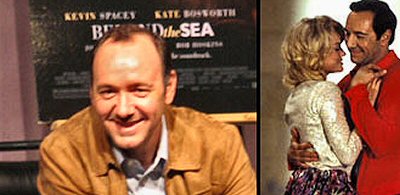Vega Obliqua
There’s always a faint air of suppression when a successful European actress turns up in a Hollywood film.
If the actress is known on her native soil for being soulful, carnal, cerebral or feisty, she always seems a bit congealed and worked over after submitting to the big American studio machine. Not misunderstood or mishandled, exactly…but slightly under-utilized and at the same time made over in a kind of broadly accessible way, like she’s been told to adopt an attitude and a vibe that would fit right into a chit-chat session on “The View.”

I’ve been getting this feeling, vaguely, after watching the enticing Spanish actress Paz Vega in the trailer for James L. Brooks’ Spanglish (Columbia, 12.17).
Nobody I know has seen this highly anticipated domestic comedy-drama, which costars Adam Sandler, Tea Leoni and Cloris Leachman. And if I know anything about the ultra-perfectionist Brooks, nobody will until early December.
< ?php include ('/home/hollyw9/public_html/wired'); ?>
But I feel as if I know the 28 year-old Vega from her knockout performance role in Julio Medem’s Sex and Lucia. This 2001 film was quite the erotic testament and a favorite with a lot of women I know, and Vega was extremely open and passionate and emotionally varied in that film (as well as….well, energetic).
Anyone who’s seen and enjoyed Lucia has, I’m sure, felt the same disconnect I’ve gotten from the Spanglish trailer.
Vega plays Flor, a young Mexican emigre who’s come to Los Angeles with her daughter Christina (Victoria Luna) and has been lucky enough to find a live-in housekeeping gig with the affluent John and Deborah Clasky (Adam Sandler, Tea Leoni). Certain cross-cultural issus arise, plus some non-cultural ones. John is a top-tier chef with concerns about his industry status; Deborah has lost her job and is suffering a spiritual crisis.
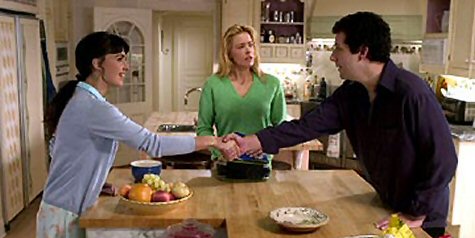
According to the trailer, the film is largely about the Clasky’s neurotic hang-ups and work-related anxieties, and the contentious relationship between Leoni and her formerly alcoholic, blunt-spoken mom (Leachman). There’s an implication that things in the Clasky household change and go through some kind of spiritual uplift due to the influence of Flor, and yet…
Vega hardly says a word in the trailer (she doesn’t speak any English when she first lands the Clasky job — Vega didn’t speak it either, and had to learn it for the film)…
The trailer never seems to focus on anything that Flor is feeling or doing on her own — it’s all about the Clasky’s reacting to her or talking about her….
And Vega doesn’t seem to do anything in the trailer except turn to the camera and fluff her hair and gaze at the Clasky’s with this beatific, wide-eyed Mexican earth-mother expression.
Who is she? What is the story and what does she bring to the table? Why doesn’t the trailer show Flor saying just one clean sentence that expresses a single direct emotion about anything?
There’s a clip with Leachman telling Leoni she’s going to lose her husband, which seems to imply that some kind of affair develops between Sandler and Vega, although Leachman could be referring to something else entirely.
So there’s all this vagueness and obliqueness from the trailer, and yet I’ve been told that Spanglish is essentially about Vega’s character, and that the story more or less turns on her.
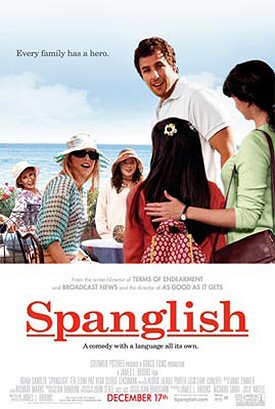
No mystery here. The Columbia trailer guys have obviously decided it’s easier to sell Sandler, Leoni and Leachman than Vega, but it makes for a weird piece. You can feel that the great Brooksian dialogue spoken by the Clasky family is not conveying what’s really going on, and that something of substance (almost certainly having to do with Flor) happens in this film, but the trailer won’t say what this might be.
I know — okay, trust — that Spanglish will be a smart and emotionally affecting film, because I feel I know and trust Brooks. It’s just odd the way the trailer leaves you hanging.
There’s a one-page VANITIES piece about Vega on page 323 in the current December issue of Vanity Fair.
“When Jim talks about the movie,” Vega tells writer Kista Smith, “he says `realistic comedy.’ It’s really, really fun, but sometimes you can cry at the same time.”
Vega was born Paz Campos Trigo on January 2, 1976, in Seville. She left school at age 16 and got herself accepted to Seville’s Centro Andaluz de Teatro acting school, where she spent two years and then studied journalism for another two. At age 22 she moved to Madrid, changed her last name to Vega (her grandmother’s) and went on auditions.
In 1999, she snagged a major role in Zapping, in which she played a hottie who steals another woman’s husband. She eventually landed a large role in the Spanish TV series, 7 vidas. This resulted in a lead role in Mateo Gil’s Nobody Knows Anybody, which caught Julio Medem’s attention and resulted in Vega’s career- making role in Sex and Lucia.
This, in turn, led to Pedro Almodovar giving her a small role in Talk to Her (’02) and then landing a part in the Spanish musical romantic comedy, The Other Side of the Bed (’02). The sum of this, of course, led to Spanglish.

Does Brooks have some kind of emotional susceptibility for south-of-the-border working-class women with struggling English skills? I’m wondering out loud.
Remember Lumi Cavazos’s wonderful “Inez” character in Bottle Rocket ? Brooks was the executive producer on that film, and developing Inez — a Venezuelan maid at a small Texas motel — was a major passion of his. Brooks labored for a few months on the script with director Wes Anderson and costar-co-screenwriter Owen Wilson, and insisted they develop the romantic subplot between Inez and Anthony (Luke Wilson) until every last drop of appropriate emotion had been squeezed out.
This effort paid off, if you ask me. This is one reason why I trust Brooks. He really sweats his scripts.
The Horror
On Election Day, 11.2 — a dark day for millions of decent people with solid moral values — one of the strangest and creepiest religious films ever made arrived in DVD stores, courtesy of New Line Home Entertainment.
Michael Tolkin’s The Rapture is a kind of horror film. It’s initially about an emotionally hungry woman named Sharon (Mimi Rogers) who’s into swinging, and then discovers that God fills her more profoundly. His light makes her shine and smile and go into bloom. But then she feels the End of Days approaching, and starts to go a little crazy.
She goes into the desert to wait for the big moment. Not long after (and I won’t explain the blow-by-blow) Sharon fires a bullet into her daughter’s head. In her spiritually desperate and cranked-up state, she believes this is a way to send her little girl straight to God.
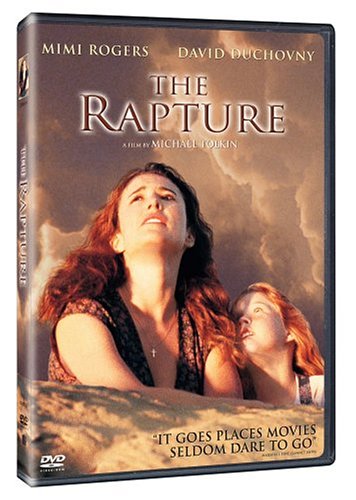
Then comes the literal Apocalypse. The sounds of charging horses and Gabriel’s trumpet fill the skies. God and His angels are portrayed by Tolkin as warriors, spiritual avengers, terrible horsemen…forces ready to trample. But the after-shock of her daughter’s death persuades Sharon to reject God just as she’s being literally lifted up to Heaven. She’s furious that her devotion to God led her to slaughter her own, and so she refuses His embrace.
The Rapture is an odd, terrifying, occasionally serene, infuriating, deeply upsetting film. You can argue about it with yourself for days, weeks, months. I still haven’t completely settled down about it, and it’s been thirteen years.
More than any other single factor, The Rapture convinced me that born-again Christians and conservative word-of-God testifiers are creepy people. It persuaded me that anyone who talks about the rapture and ascending to Heaven is invested in something I don’t ever want to get close to, much less buy into.
The Godly terms laid down in The Rapture are not about love or goodness or caressing celestial compassion. They’re about black and white absolutes. Are you on the bus or not? Have you paid your dues and settled up with the Almighty, or are you a lost person? If you’re square with God, welcome. If you’re not, tough.
If you’ve never seen it, and you’ve been teetering on the religious-philosophical fence in recent years and you need a movie to push you into permanent atheism and skepticism about religious nutbags, The Rapture is a film to see.

I’m not saying it’s totally on the side of religious doubters or atheists (it seems to be of two minds for a good portion of it), but if Roman and Minnie Castevet had lived longer they would have loved The Rapture .
I love the idea of Red State religious types renting or buying this thing in hopes of watching a spiritual film that really understands what it means to be a true believer. It apparently has that reputation in some circles. Booiinngg!
If there really is a vengeful God up there in the clouds who’s planning to get on a mighty steed sometime around 2013 and gallop down to earth and smite the sinners, Michael Tolkin is one of the first people he’ll pay a visit to. Then he’ll come after people like me. And then he’ll visit the White House for tea and tuna-fish sandwiches.
Prick Up Your Ears
Susan Snyder of Chicago, Illinois, was the first to correctly identify all three of Friday’s (11.5) sound clips.
Clip #1 is from Alfred Hitchcock’s Foreign Correspondent (1940), and is mostly dominated by the voice of George Sanders as British journalist Scott ffolliott. Clip #2 is the voice of Tom Dunson (John Wayne) saying bitter words to Matthew Garth (Montgomery Clift) in Howard Hawks’ Red River (1948), and Clip #3 is a scene between Elliott Gould and George Segal in Robert Altman’s California Split (1974).
Today’s excerpts are all Europe-based: (a) Clip #1 is a bit compromised by the sounds of breaking surf, but the dialogue is too good to pass up; (b) Clip #2 has a certain serenity to it; and (c) Clip #3 is so brilliantly delivered by such a superb actor, it makes me want to re-hear the entire scene.
Send in your answers quickly, and I’ll post the winner in Friday’s column.
Eyes Averted
I had trouble last Friday writing about a documentary called Imaginary Witness: Hollywood and the Holocaust, and here I am still having trouble. As I watched it I was going “yup, yup….good stuff…uh-huh, yup,” and now my head is crashing into the keyboard every time I try to write a line about it.
All right….grim up, focus, cut through it.
Funded by the American Movie Channel and shown yesterday (Tuesday, 11.9) at the AFI Film Festival, Daniel Anker’s 92-minute documentary is a thorough, professionally assembled thing. It’s basically about how Hollywood ignored the Holocaust when it was happening, but then came started to pay atention 14 or 15 years after the end of World War II, and then really started to mine the territory in the `90s.
I talked to Anker about it last week. He’s a frank and friendly guy. His film is well thought out (relatively) and full of newsreel clips I’d never seen before. The subject of the film, he said, is basically “what did we know and when did we know it? Specifically it’s about what each film that dealt in any way with the Holocaust actually said or uncovered about it, and how these films portrayed the time sin which they were made.”
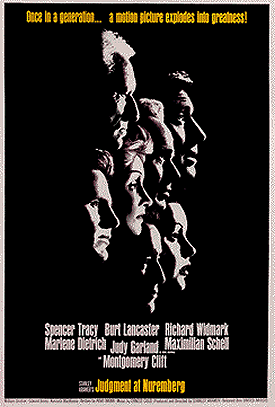
Anker does a perfectly acceptable job of showing how Hollywood films explored the realities of European life in the 1930s and just after it. Pressure was put on Hollywood to refrain from taking sides in the European conflict. Jewish studio heads were told that any kind of advocacy might backfire in some way. Their reticence seems amazing from today’s perspective.
Although a group of studio chiefs were invited by Gen. Dwight D. Eisenhower to inspect German concentration camps around the war’s end, there was almost no depictions of concentration camps in movies until….well, I can’t precisely remember, but one of the first instances, I think, was when camp footage showed up in the TV version of Judgement at Nuremberg in ’59 or thereabouts, on CBS’s “Playhouse 90.”
Stanley Kramer’s better-known feature film version hit screens in ’61.
“The footage in the TV presentation was much more graphic and honest than [Kramer’s] version,” Anker says. “It was incredibly graphic…it was surprisingly harsh for television. TV in the `50s was much more honest about the Holocaust than Hollywood was.”
Another graphic televised depiction was provided by War and Remembrance, Dan Curtis’s 30-hour miniseries, in the late 1970s.
Variety‘s review noted that Anker ignored serious B-movie explorations of the Holocaust, among them Sam Fuller’s “sensationalistic” Verboten (1959).
Steven Spielberg’s Schindler’s List (1994) took viewers on the strongest and most penetrating emotional journey into the Holocaust, and is presented as such in the doc.
A lot of people in this town feel Holocaust-ed out from all the docs about this or that Holocaust angle, many of which have been nominated for Oscars. I hear that — there’s such a thing as overplaying a hand — but I’ve never been less than riveted by any half-decent account of this ghastly history. There’s no such thing as hearing too much about it.
War Between the States
“I think in your various pro-Blue, anti-Red blurbs, you and others dismissed the Undecideds as simply intellectually vacuous wafflers who couldn’t come down on one side or the other on one of the most black and white issue in recent memory.
“I really don’t think that is the case. I live in Norty Carolina, which is one of the oddest of Red states, since we vote Republican nationally and Democratic on a state level. I’m a Republican, but evaluate candidate by candidate who I should choose based on policies and positions I agree with. And I didn’t really agree with either.
“What I finally came down to was a sports analogy. There is a time in every losing season where you consider the rest of the year a lost cause and start looking to the next season. That’s basically what I did. I voted based on who I figured could screw up the least for the next four years until there was a better choice.

“Because of that I voted for Kerry (the first time I’ve ever voted Democratic for President). I figured, though he would be ineffective in a way to rival the Carter Administration, his lack of a strong vision would, if nothing else, maintain the status quo.
“Other Purple Voters, as I figure we should be called, came down on the opposite side of that equation, figuring that Bush ended up with one or two more tick marks in his column than Kerry. I’m sure, like me, they were looking for that legitimate and good reason to vote for Kerry, as opposed to just not voting for Bush.
“You, yourself, in your many columns devoted to this issue, rarely if ever said why we should vote for Kerry — just why we shouldn’t vote for Bush. For me and others, the rhetoric got old. We got the point. Bush is evil. Now tell us why to vote for your guy.” — Charlotte, North Carolina guy who asked fo ranonymity
Wells to North Carolina guy: You’re a German citizen in the mid ’30s and you don’t have the ability to see what will happen under Hitler over the next few years, but you can vaguely sense it. And Hitler has decided not to suspend elections and be fair about it and run again in ’36 or ’37.
You’re telling me that unless a guy comes along whose only campaign pitch is that he’s not Adolf Hitler — and is therefore a much less damaging person to have in the top spot — you’re going to be on the fence about it? Unless this other guy offers specific reasons to vote for him, and not just reasons to vote against Hitler, you might not be persuaded to vote against Hitler…that a negative vote isn’t enough of a reason?
I’m not analogizing Bush with Hitler. Well, I am a little bit, I suppose. I’ve just found that people tend to listen up when you use Nazi Germany as an example.
Issue
If I were Kevin Spacey, I’d be thinking about doing some repair work right about now. Some guys look completely fine or at least marginally okay with seriously thinning hair or even a shaved head, but Spacey isn’t one of them. (Neither am I, actually.) Not a big deal. Remedies are available.
